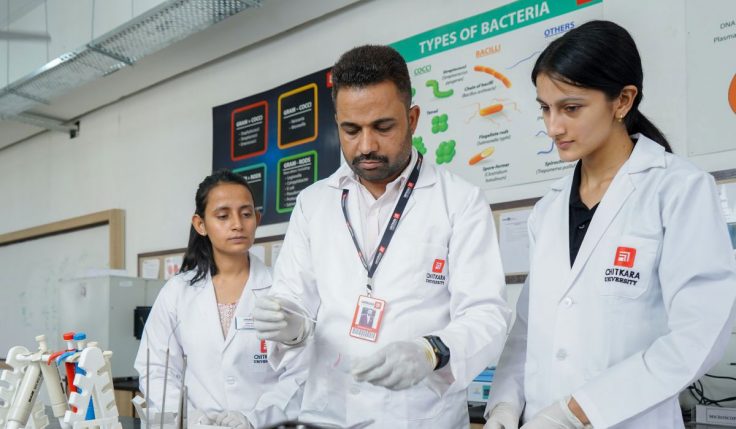What is M. Pharmacy (Master of Pharmacy)?
The terms “pharmacist”, “chemist”, or “druggist” are frequently used to refer to medical practitioners. Each distinct phrase identifies their various job duties in the pharmacy industry. To work in a senior position and earn good money in the pharmaceutical business, candidates must obtain a Masters in Pharmacy. They offer guidance to patients, physicians, and other healthcare professionals regarding the usage of medications, appropriate dosage, and adverse effects. They also provide instructions on the diet which is needed to be consumed during medication. Which medications can be purchased over the counter and which ones require a prescription are determined by a skilled pharmacy professional. A primary degree holder serves many roles from dispensing drugs to the healthcare industry, preparing and carrying out lab testing to scientific research on drugs and medicines.
The M. Pharm course duration is for two years. It is designed to equip the students with knowledge of the entire pharmaceutical sector. It offers knowledge of pharmacy that includes both conventional and advanced procedures on theoretical and application levels. The healthcare sector offers a wealth of prospects to those with a master’s in pharmacy. A master of pharmacy is important for more than only drugstores and wholesalers. The degree covers more than just drug research and experimentation; it also covers sales, marketing, drug legislation, the creation of health policy, and quality assurance concerning the management of food and drug development.
Scope of M. Pharmacy:
The M. Pharmacy program is created in a way that candidates who have had first-hand experience in the field will learn more. A person with a degree in pharmacy not only has theoretical knowledge, but also technical, research, and practical knowledge. A medical practitioner with a degree is thought to have a big advantage over doctors in terms of the depth of information they have gained for many years working in the field. Holders of M. Pharmacy degrees are not constrained to a single position in the industry. The applicants with M. Pharmacy degrees work in the business side of the sector. The Food and Drug Development Administration hires M. Pharmacy graduates for positions in drug research and development, sales, marketing, drug regulations, clinical trial research, and quality and health policy improvements.
PROs of M. Pharmacy:
The course of M. Pharmacy is structured in such a way that it provides learnings of the entire medicinal and drug industry. It provides numerous opportunities for individuals to serve various roles from dispensing drugs to the healthcare industry, preparing and carrying out lab testing to scientific research on drugs and medicines.
When it comes to life sciences, pharmacy is one of the most advanced and active fields. Every day, a new drug or vaccine is developed and made commercially available to treat a variety of human diseases. No medical science can exist without the pharmaceutical industry, and vice versa. Both medical science and pharmacy are co-dependent.
Tele-pharmacy is expanding, and many employers are allowing employees to work remotely. For many years, the Veterans Administration has used virtual pharmacists. You can work for yourself: Despite stiff competition from chain drug stores, many independent pharmacies are thriving. Specialty pharmacies are a rapidly expanding industry.
Pharmacists with an M. Pharm degree can expect to earn well and advance in their careers. Medication specialists do their best to assist outpatients. Above all, it is not only the monetary benefit but also the moral satisfaction that is important. M. Pharma’s salaries range from 6 to 8 lakhs per year.
The high demand for pharmacists provides numerous advantages. Pharmacists are in high demand in most industries across the country and abroad. A highly qualified and competent pharmacist can work in more positions and settings than ever before.
CONS of M. Pharmacy:
Slow job growth: The projected growth in pharmacy jobs is discouraging, especially when you factor in the number of new pharmacy graduates that enter the workforce every year
Poor branding: While pharmacists are well-respected, most consumers and other healthcare professionals do not fully understand or value our role in healthcare beyond filling prescriptions. A marketing and branding campaign is required for the pharmacy profession.
Barriers to entry include licensure, the years of training required, and the high cost of pharmacy education. This prevents the profession from becoming oversaturated and protects pharmacy jobs.
In some cases, a pharmacist works long hours because there are not enough pharmacists to cover the hours the pharmacy is open. Depending on the number of pharmacy assistants on hand, the pharmacist may have to do a lot of reaching and bending while filling prescriptions. The pharmacist spends most of the workday on the feet. Furthermore, there may not be consistent work hours from week to week.
A retail pharmacist must not only dispense prescriptions but also answer customer questions about a variety of illnesses. Retail pharmacists also deal with insurance issues; they must be familiar with insurance regulations to properly fill out insurance claim paperwork. This additional time spent on paperwork reduces the amount of time the pharmacist spends filling prescriptions.
After being accepted into the Master of Pharmacy program, the student pharmacist continues to take additional courses for three to four years. Aside from coursework in pharmacology-related studies, the student works in a variety of settings, including retail pharmacies and hospitals. The successful student pharmacist receives a Doctor of Pharmacy, or Pharm.D., degree at the end of this rigorous training period.
As pharmacists, M. Pharm students have numerous job opportunities. The increased number of healthcare institutions and R&D organizations has increased the number of job opportunities for skilled professionals. Pharmacists play an important role in the medical and treatment fields. Pharmacists can even open their pharmacies in their communities and earn a good living. They are also employed in healthcare and research and development organizations. Pharmacists have a wide range of job options. Chitkara University is one of the best institutes which provides promising career opportunities in the field of M. Pharmacy for students who are seeking jobs and careers in this domain.






